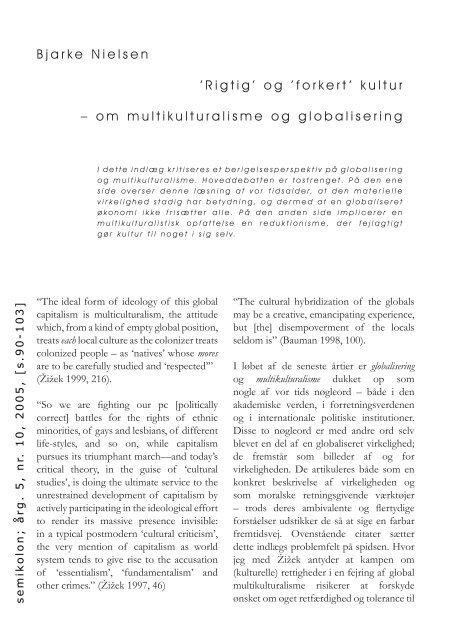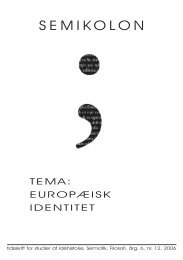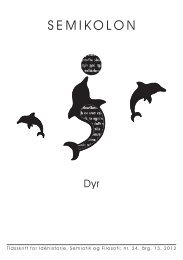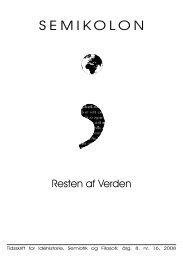S E M I KO L O N - EgernInc
S E M I KO L O N - EgernInc
S E M I KO L O N - EgernInc
Create successful ePaper yourself
Turn your PDF publications into a flip-book with our unique Google optimized e-Paper software.
s e m i k o l o n ; å r g . 5 , n r. 1 0 , 2 0 0 5 , [ s . 9 0 - 1 0 3 ]<br />
B j a r k e N i e l s e n<br />
’ R i g t i g ’ o g ’ f o r k e r t ’ k u l t u r<br />
– o m m u l t i k u l t u r a l i s m e o g g l o b a l i s e r i n g<br />
I d e t t e i n d l æ g k r i t i s e r e s e t b e r i g e l s e s p e r s p e k t i v p å g l o b a l i s e r i n g<br />
o g m u l t i k u l t u r a l i s m e . H o v e d d e b a t t e n e r t o s t r e n g e t . P å d e n e n e<br />
s i d e o v e r s e r d e n n e l æ s n i n g a f v o r t i d s a l d e r, a t d e n m a t e r i e l l e<br />
v i r k e l i g h e d s t a d i g h a r b e t y d n i n g , o g d e r m e d a t e n g l o b a l i s e r e t<br />
ø k o n o m i i k k e f r i s æ t t e r a l l e . P å d e n a n d e n s i d e i m p l i c e r e r e n<br />
m u l t i k u l t u r a l i s t i s k o p f a t t e l s e e n r e d u k t i o n i s m e , d e r f e j l a g t i g t<br />
g ø r k u l t u r t i l n o g e t i s i g s e l v.<br />
“The ideal form of ideology of this global<br />
capitalism is multiculturalism, the attitude<br />
which, from a kind of empty global position,<br />
treats each local culture as the colonizer treats<br />
colonized people – as ‘natives’ whose mores<br />
are to be carefully studied and ‘respected’”<br />
(Žižek 1999, 216).<br />
“So we are fighting our pc [politically<br />
correct] battles for the rights of ethnic<br />
minorities, of gays and lesbians, of different<br />
life-styles, and so on, while capitalism<br />
pursues its triumphant march—and today’s<br />
critical theory, in the guise of ‘cultural<br />
studies’, is doing the ultimate service to the<br />
unrestrained development of capitalism by<br />
actively participating in the ideological effort<br />
to render its massive presence invisible:<br />
in a typical postmodern ‘cultural criticism’,<br />
the very mention of capitalism as world<br />
system tends to give rise to the accusation<br />
of ‘essentialism’, ‘fundamentalism’ and<br />
other crimes.” (Žižek 1997, 46)<br />
“The cultural hybridization of the globals<br />
may be a creative, emancipating experience,<br />
but [the] disempoverment of the locals<br />
seldom is” (Bauman 1998, 100).<br />
I løbet af de seneste årtier er globalisering<br />
og multikulturalisme dukket op som<br />
nogle af vor tids nøgleord – både i den<br />
akademiske verden, i forretningsverdenen<br />
og i internationale politiske institutioner.<br />
Disse to nøgleord er med andre ord selv<br />
blevet en del af en globaliseret virkelighed;<br />
de fremstår som billeder af og for<br />
virkeligheden. De artikuleres både som en<br />
konkret beskrivelse af virkeligheden og<br />
som moralske retningsgivende værktøjer<br />
– trods deres ambivalente og flertydige<br />
forståelser udstikker de så at sige en farbar<br />
fremtidsvej. Ovenstående citater sætter<br />
dette indlægs problemfelt på spidsen. Hvor<br />
jeg med Žižek antyder at kampen om<br />
(kulturelle) rettigheder i en fejring af global<br />
multikulturalisme risikerer at forskyde<br />
ønsket om øget retfærdighed og tolerance til












